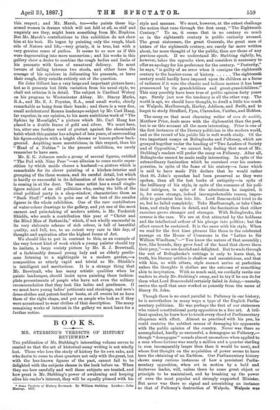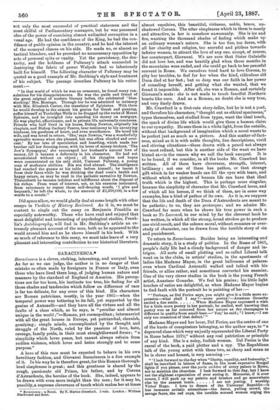BOOKS.
MR. STEBBING'S VERDICTS OF HISTORY RETIEWED.5 'THE publication of Mr. Stebbing's interesting volume serves to remind us that the art of historical-essay writing is not wholly lost. Those who love the study of history for its own sake, and who desire to come to close quarters not only with the great, but with the less-known figures of the past, cannot fail to be -delighted with the subjects chosen in the book before us. When they see how carefully and well these subjects are treated, and how great is Mr. Stebbing's power of awakening and keeping alive his reader's interest, they will be equally pleased with his Some Verdicts of History Beriemsd. By William Robbing. London: John Murray. 1887, style and manner. We must, however, at the outset challenge the notion that runs through the first essay, "The Eighteenth Century." To us, it seems that in no century so much as in the eighteenth century is public cariosity aroused. The great statesmen, the great Generals, the great men of letters of the eighteenth century, are surely far more written about, far more thought of by the public, than are those of any previous epoch. If we understand Mr. Stebbing rightly, he, however, takes the opposite view, and considers it necessary to offer an apology for his preference for the century. "Posterity," he says, "is guilty of an error when it consigns the eighteenth century to the lumber.room of history The eighteenth century could hardly have imposed upon its children as a focus of radiance if it were the chaotic and tedious morass it has been pronounced by its grandchildren and great-grandchildren." This may possibly have been true of public opinion forty years ago. Surely just now the tendency is all the other way. The world is apt, we should have thought, to dwell a little too much on Walpole, Marlborough, Harley, Addison, and Swift, and to forget to study Strafford, Pym, Clarendon, Fairfax, and Hobbes.
The essay on that most charming writer of sere de sociiti, Matthew Prior, deals more with the diplomatist than the poet, but is on this account all the more interesting. Prior is one of the first instances of the literary politician in the modern world, and so the record of his public life is well worth study. Of the two important essays on Bolingbroke and Pulteney, which are grouped together under the heading of "Two Leaders of Society and of Opposition," we cannot help feeling that most of Mr. Stebbing's readers will prefer the essay on Pulteney. After all, Bolingbroke cannot be made really interesting. In spite of the extraordinary fascination which he exercised over his contem- poraries, in spite of the fame of his oratory—a fame which is said to have made Pitt declare that he would rather that St. John's speeches had been preserved as they were spoken, than all the lost books of antiquity—in spite of the brilliancy of his style, in spite of the romance of his poli- tical intrigues, in spite of the admiration he inspired, it is, for some strange, indeed incomprehensible reason, impos- sible to galvanise him into life. Lord Beaconsfield tried to do so, but he failed completely. Take Marlborough, or take Chat- ham, and study them in detail, and the fascination that either exercises grows stronger and stronger. With Bolingbroke, the reverse is the case. We are at first attracted by the boldness and the intellectual ardour of his plunge into politics; bat the effect cannot be sustained. It is the same with his style. When we read for the first time phrases like those in the celebrated passage on the House of Commons in the "Letter to Sir William Windham,"—" You know the nature of that assembly ; how, like hounds, they grow fond of the hand that shows them their prey,"—we are dazzled and delighted. But to wade through the rest of Bolingbroke's writings is only to learn that, in truth, his literary artifice is shallow and meretricious, and that with him, as with others, style cannot arrive at perfection unless the thoughts it clothes are the outcome of something akin to inspiration. With so much said, we cordially invite our readers to study Mr. Stebbing's essay, and to try if he can do for them what Lord Beaconsfield certainly failed in doing,—namely, revive the spell that once worked so potently from the name of Henry St. John.
Though there is no exact parallel to Pulteney in our history, he is nevertheless in many ways a type of the English Parlia- mentary politician. He was perhaps the first of our statesmen who raised constitutional party opposition to a fine art. A bril- liant speaker, he knew how to touch every chord of Parliamentary eloquence with effect. Almost as practised with his pen, he could contrive the subtlest means of damaging his opponents with the public opinion of the country. Never was there so accomplished, hardly so successful, a demagogue as Pulteney,— though "demagogue" sounds almost anomalous when applied to a man whose fortune was nearly a million and a quarter sterling (a sum incomparably larger then than it would be now), and whose first thought on the acquisition of power seems to have been the obtaining of an Earldom. Our Parliamentary history shows many curious instances of how a persistent Parlia- mentary opposition, when set in motion by a bold and dexterous leader, will, unless there be some great object or principle to be maintained, end by breaking up the power of even the most popular and strongly supported Minister. But never was there so signal and astonishing an instance as that of Palteney's destruction of Walpole. Walpole was
not only the most successful of practical statesmen and the most skilful of Parliamentary managers, but he was possessed also of the power of exercising almost unlimited corruption in a venal age. He had the confidence of the King, he had the con- fidence of public opinion in the country, and he had the interest of the moneyed classes on his side. He made no, or almost no tactical blunders, and he provoked no unnecessary opposition by acts of personal spite or vanity- Yet the persistency, the dex- terity, and the boldness of PaBeliefs attack succeeded in destroying the fabric of power Walpole had so laboriously built for himself. The following character of Pulteney may be quoted as a good example of Mr. Stebbing's style and treatment of his subject. The passage describes Pulteney in his retire- ment :— " In that world of which be was an ornament, he found many con- solations for his disappointments. He was the guide and friend of the great original of modern literary ladies, the celebrated ' blue- stocking,' Mrs. Montagu. Through her he was admitted to intimacy with Mrs. Elizabeth Carter, the translator of Epictetus. With them he would develop to the utmost his genius for Greek and punning, suffer himself at Tunbridge Wells to be dragged up the rocks of Mount Ephraim, and be inveigled into spending his money on nosegays. He was playful, affectionate, and in private life universally courteous. Friends who half lived in his honse, Bishop Newton, originally his chaplain, and Bishop Zachary Pearce, bear testimony to his unvarying kindness, his goodness of heart, and even munificence. He loved his wife, and was loved in return. 'She,' Bays Newton, was a wonderfully agreeable woman when she pleased, but was often clouded and over- cast.' By her love of speculation and hoarding, which made her brother call her dressing.room, with its levee of money.brokers, The Jew's Synagogue,' she encouraged her husband's natural love of money, till it became a deformity in his character. He had not accumulated without an object ; all his thoughts and hopes were concentrated on his only child, Viscount Palteney, a yonng man of moderate abilities. His son died abroad. The intelligence had reached the guests at his table before himself; he learnt it from their faces while he was drinking the dead man's health and happy return, as may be read in the pathetic narrative by Newton. Thenceforth he became indolent and indifferent about the disposal of Isis riches. From want of interest, not, as his enemies insinuated, from reluctance to repeat those self-denying words, 'I give and bequeath,' he left the whole, to the amount of £1,200,000, in a few words to a cousin."
Did space allow, we would gladly deal at some length with other essays in Verdicts of History Reviewed. As it is, we must be content to single out the essay on Benjamin Franklin as especially noteworthy. Those who have read and enjoyed that most delightful and interesting of psychological studies, Frank- lin's Autobiography, will find in Mr. Stebbing's article an ex- tremely pleasant account of the man, both as he appeared to the world around hint and as he shows himself in his book. With so much of reference to this essay, we must take leave of a very pleasant and interesting contribution to our historical literature.



































 Previous page
Previous page